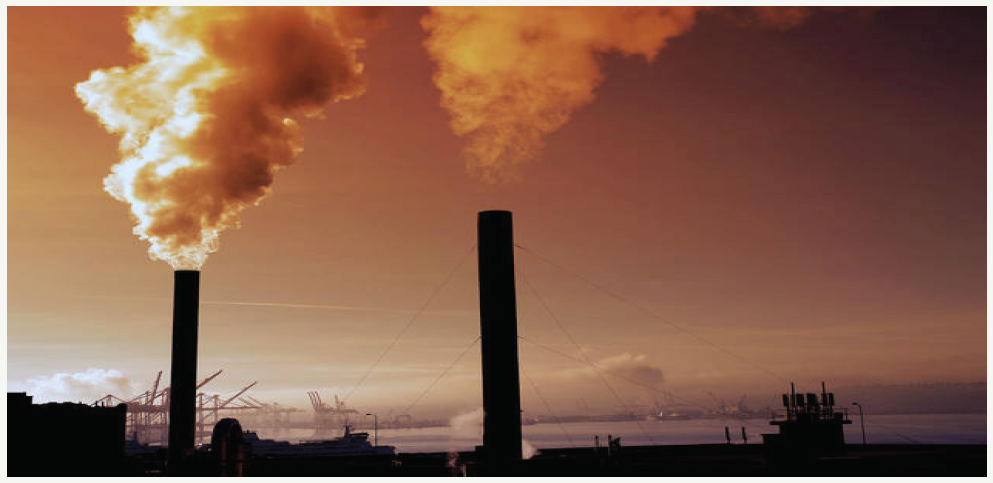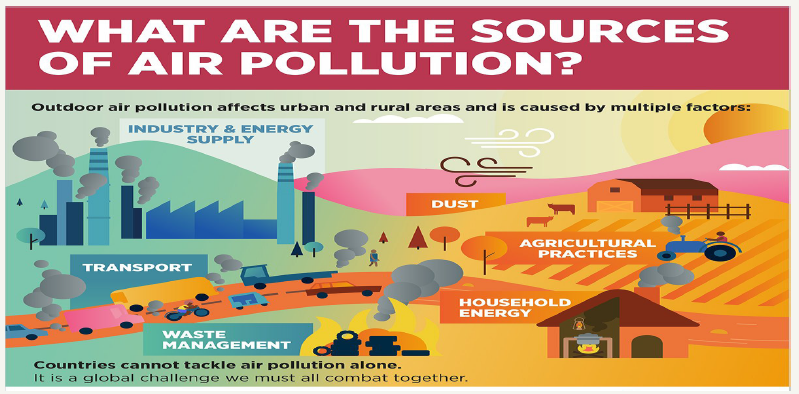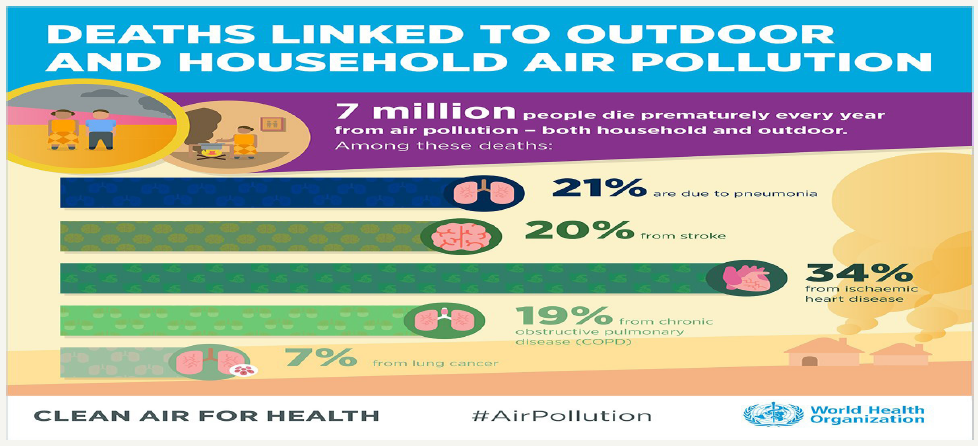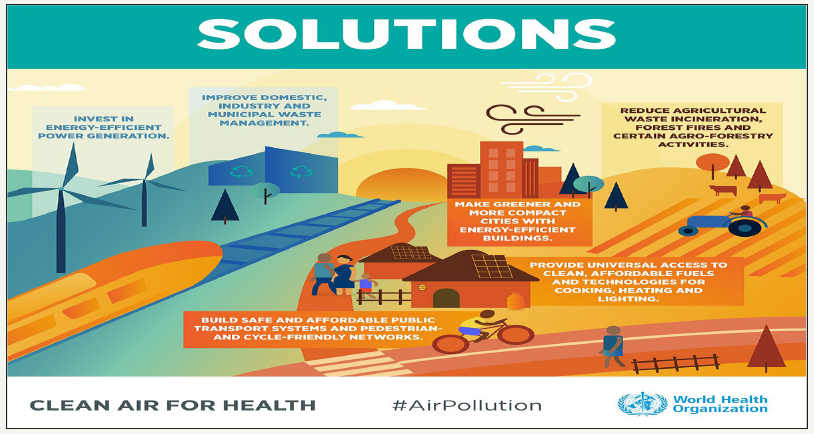- Submissions

Full Text
Environmental Analysis & Ecology Studies
Air Pollution: An Emerging Silent Killer
Akshey Bhargava1* and Swati Bhargava2
1Department of Civil Engineering, Global Institute of Engineering and Technology, India
2AA School of Architecture, London, UK
*Corresponding author: Akshey Bhargava, Professor Department of Civil Engineering, Global Institute of Engineering and Technology, Hyderabad,India
Submission: May 29, 2018; Published: July 02, 2018

ISSN 2578-0336 Volume3 Issue3
Abstract
Air pollution is growing fast on a global level on account increasing population and consequently to meet the demand and life style through extensive industrialization, urbanization and transportation. All these activities contribute significant air pollution indoors and out door causing serious diseases to human beings including deaths. In other words, such increased air pollution is emerging as silent killer. An effort has therefore been made by the authors of the present paper to briefly give an overview of catastrophic effect of air pollution at global scale.
Keywords: Air pollution; Air pollutants; Deaths; Solutions
Introduction
Air pollution can generally be defined as release of pollutants into the air which are detrimental to human health and to the entire environment. The predominant sources of air pollution are in the form industrial activities, urbanization and transportation mainly on account of energy use and production. Burning fossil fuels releases gases and chemicals into the air in the form of CO2, CO, Sox, NOx, Pb, Benzene, Acid fumes, methane, carbon sulfide, fluorine based gases, ozone and so on so forth along with particulate matter. CO2 and methane causes green house effect thereby contribute to climate change and global warming raising the earth’s temperature. Other impacts of air pollution are heat island effect, albedo effect, increased ultraviolet radiation and health [1]. A visual picture of air pollution is depicted in Figure 1.
figure 1: Showing air pollution smoke.

Sources of Air Pollution
The predominant sources of air pollution are from industrial activities including energy production and supply along with activities relating to transport, agriculture, house hold fuel burning, waste dumping and burning and commercial as reflected in Figure 2.
figure 2: Showing sources of air pollution.

Effects of Air Pollution
Smog and soot
Smog and ground level ozone are the two significant types of air pollution which occurs when emissions from combusting fossil fuels react with sunlight. The inhalable airborne particles in the form of soot are dangerous because they can penetrate the lungs and bloodstream causing bronchitis, lead to heart attacks and even death. Smog can irritate the eyes, throat and also damage the lungs predominantly in respect of children and senior citizens who work or exercise outside. Soot can even be more worse for people who already have asthma or allergies resulting into intensifying the chances of asthma attacks [2].
Hazardous air pollutants
Mercury, lead, dioxins and benzene are emitted during gas or coal combustion, incinerating and are dangerous even if emitted in small quantities. Benzene is classified as a carcinogen by the EPA and can cause eye, skin and lung irritation in the short term and blood disorders in the long term. Dioxins are found in food but also present in small amounts in the air which can affect the liver in the short term and harm the immune, nervous and endocrine systems. Lead in large amounts can damage children’s brains and kidneys and even in small amounts it can affect children’s IQ and ability to learn whereas Mercury affects the central nervous system. Polycyclic aromatic hydrocarbons or PAHs are toxic components of traffic exhaust and in large amounts, they have been linked to eye and lung irritation, blood and liver issues and even cancer [2].
Greenhouse gases
EPA study of 2014 reveals the fact that carbon dioxide was responsible for 81 percent of total greenhouse gas emissions whereas methane accounts for 11 percent which resulted in trapping the earth’s heat in the atmosphere and lead to warmer temperatures. Such an event lead to climate change thereby experiencing rising of sea levels, more extreme weather, heatrelated deaths and increasing transmission of infectious diseases like Lyme. Though large amount of carbon dioxide is emitted out but methane is significantly more potent and also very destructive along with hydro fluorocarbons (HFCs) which are thousands of times more powerful than carbon dioxide in their ability to trap heat [2].
Pollen and mold
Pollen and molds are released from trees, weeds and grass into air which are hazardous to health. Mold exposure can precipitate asthma attacks or an allergic response and can even produce toxins that would be dangerous for health whereas Pollen allergies are dangerous because of climate change and ragweed pollen lead to suffer runny noses, fevers, itchy eyes and other symptoms [2].
Air Pollution-Turning Silent Killer
The world health organization (WHO) reveal the fact that air pollution levels are alarmingly high in many parts of the world in as much as that 9 out of 10 people breathe air containing high levels of pollutants. Besides, it has also been reported by WHO that an alarming death toll of 7 million people every year caused by ambient (outdoor) and household (Indoor) air pollution. Moreover, over 3 billion people out of which mostly women and children are still breathing poisonous smoke every day from using polluting stoves and fuels in their homes. The WHO also reveal the fact that fine particles in polluted air penetrate deep into the lungs and cardiovascular system, causing diseases including stroke, heart disease, lung cancer, chronic obstructive pulmonary diseases and respiratory infections, including pneumonia. It has been reported that 21 percent death caused due to pneumonia, 20 percent from stroke, 34 percent from ischemic heart diseases, 19 percent from chronic obstructive pulmonary disease (COPD) and 7 percent from lung cancer [3] as shown in Figure 3.
figure 3: Showing death linked to outdoor and indoor air pollution.

The WHO has reported that the ambient air pollution alone caused around 4.2 million deaths while household indoor air pollution caused about 3.8 million deaths in the year 2016. However, more than 90% of air pollution-related deaths occur in low- and middle-income countries such as Asia and Africa followed by low to middle-income countries of the Eastern Mediterranean region, Europe and the Americas. Moreover, around 3 billion people which amounts to more than 40% of the world’s population do not have access to clean cooking fuels and technologies in their homes resulting into household air pollution [3].
figure 4: Showing impacted people by air pollution.

It would also be interesting to note that pneumonia is the leading cause of death in children below the age of 5 years which emerges as the main risk factor whereas women working in smoky kitchen are exposed to high level household air pollution causing deaths. People working outdoors such as street vendors, traffic police, etc are affected by high air pollution as has been shown in Figure 4. It has also been reported by WHO that around 4.2 million deaths every year has been caused as a result of outdoor air pollution whereas 3.8 million deaths every year from indoor air pollution as reflected in Figure 5. Moreover, 91 percent of the world population lives in places where ambient air quality exceeds WHO guideline limits [3].
figure 5: Showing house hold air pollution impacts.

figure 6: Showing possible solutions for pollution prevention.

Solutions
In order to restrict the deadly air pollution, we may consider following actions to be taken seriously in an integrated manner [4] as reflected in Figure 6,
a.Invest in energy efficient power generation.
b.Improve domestic, industrial and municipal waste management.
c.Make greener and sustainable compact cities with energy efficient green buildings.
d.Reduce agricultural waste incineration, forest fires and certain agro forestry activities.
e.Build safe and affordable public transport systems along with pedestrian and cycle friendly network.
f.Provide universal access to clean, affordable fuels and technologies for cooking, heating and lighting.
It’s now time to give message and implement the solutions to prevent air pollution and save life’s of millions of people as symbolically presented in Figure 7.
Conclusion
Air pollution is growing fast at global level on account of industrial, urban, commercial, and house hold activities causing death of millions of people every year. It’s time now to save lives from air pollution through technological innovations, use of cleaner fuels, sustainable planning, effective implantation, excellent governance, political commitments, effective involvement of all stake holders, mass awareness among others. Research and developmental research needs to be encouraged at all levels to evolve sustainable solutions.
figure 7: Showing time to save lives.

References
- http://www.who.int/gho/phe/indoor_air_pollution/burden/en/
- WEO (2017) Special report: energy access outlook. International Energy Agency, France, pp: 1-144.
- World Health Organization (2016) Ambient air pollution: A global assessment of exposure and burden of disease. pp. 1-121.
- http://www.who.int/airpollution/ambient/health-impacts/en/
© 2018 Akshey Bhargava. This is an open access article distributed under the terms of the Creative Commons Attribution License , which permits unrestricted use, distribution, and build upon your work non-commercially.
 a Creative Commons Attribution 4.0 International License. Based on a work at www.crimsonpublishers.com.
Best viewed in
a Creative Commons Attribution 4.0 International License. Based on a work at www.crimsonpublishers.com.
Best viewed in 







.jpg)






























 Editorial Board Registrations
Editorial Board Registrations Submit your Article
Submit your Article Refer a Friend
Refer a Friend Advertise With Us
Advertise With Us
.jpg)






.jpg)














.bmp)
.jpg)
.png)
.jpg)










.jpg)






.png)

.png)



.png)






